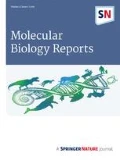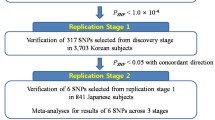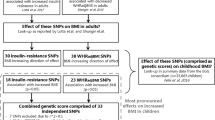Abstract
Previous studies have suggested that common variants in fat mass- and obesity-associated (FTO) gene are associated with body mass index (BMI) and the risk of obesity. Since obesity plays an important role in the etiology of high blood pressure (HBP), we aim to investigate the association between obesity and HBP in a population with different variants of the FTO gene. A total of 3,494 children (1,775 boys, 50.8 %) aged 6–18 years were recruited for measuring pubertal status, BMI and systolic and diastolic blood pressure. The single nucleotide polymorphism rs9939609 of the FTO gene was genotyped. The blood pressure levels increased by 1.4, 1.5 and 1.8 mmHg for systolic blood pressure and 0.8, 0.9 and 1.2 mmHg for diastolic blood pressure per 1-unit BMI increase in subjects carrying TT, TA and AA genotypes, respectively. After stratifying for FTO rs9939609 genotypes (TT, TA and AA), the odds ratios (95 % confidence intervals) of HBP in obese versus non-obese children were 4.26 (3.18–5.71), 5.13 (2.96–8.90) and 10.37 (1.59–67.43), respectively, with adjustment for age, gender and pubertal status. The FTO rs9939609 SNP modifies the effect of obesity on HBP in Chinese children, with obese ones carrying the AA homozygous genotype of the FTO rs9939609 having the highest risk of developing HBP.
Similar content being viewed by others
References
Franks PW, Hanson RL, Knowler WC, Sievers ML, Bennett PH, Looker HC (2010) Childhood obesity, other cardiovascular risk factors, and premature death. N Engl J Med 362:485–493
Reilly JJ, Kelly J (2011) Long-term impact of overweight and obesity in childhood and adolescence on morbidity and premature mortality in adulthood: systematic review. Int J Obes (Lond) 35:891–898
Liang YJ, Xi B, Hu YH, Wang C, Liu JT, Yan YK et al (2010) Trends in blood pressure and hypertension among Chinese children and adolescents: China Health and Nutrition Surveys 1991–2004. Blood Press 20:45–53
Xi B, Cheng H, Shen Y, Zhao XY, Hou DQ, Wang XY et al (2012) Physical activity modifies the associations between genetic variants and hypertension in the Chinese children. Atherosclerosis. doi: 10.1016/j.atherosclerosis.2012.10.027
Wang C (2011) Genetic association studies: hypertension and beyond. Hypertens Res 34:294–295
Frayling TM, Timpson NJ, Weedon MN, Zeggini E, Freathy RM, Lindgren CM et al (2007) A common variant in the FTO gene is associated with body mass index and predisposes to childhood and adult obesity. Science 316:889–894
Li H, Wu Y, Loos RJ, Hu FB, Liu Y, Wang J et al (2008) Variants in the fat mass- and obesity-associated (FTO) gene are not associated with obesity in a Chinese Han population. Diabetes 57:264–268
Peeters A, Beckers S, Verrijken A, Roevens P, Peeters P, Van Gaal L et al (2008) Variants in the FTO gene are associated with common obesity in the Belgian population. Mol Genet Metab 93:481–484
Gonzalez-Sanchez JL, Zabena C, Martinez-Larrad MT, Martinez-Calatrava MJ, Perez-Barba M, Serrano-Rios M (2009) Variant rs9939609 in the FTO gene is associated with obesity in an adult population from Spain. Clin Endocrinol (Oxf) 70:390–393
Hotta K, Nakata Y, Matsuo T, Kamohara S, Kotani K, Komatsu R et al (2008) Variations in the FTO gene are associated with severe obesity in the Japanese. J Hum Genet 53:546–553
Li X, Song F, Jiang H, Zhang M, Lin J, Bao W et al (2010) A genetic variation in the fat mass- and obesity-associated gene is associated with obesity and newly diagnosed type 2 diabetes in a Chinese population. Diabetes Metab Res Rev 26:128–132
Xi B, Mi J (2009) FTO polymorphisms are associated with obesity but not with diabetes in East Asian populations: a meta-analysis. Biomed Environ Sci 22:449–457
Kurukulasuriya LR, Stas S, Lastra G, Manrique C, Sowers JR (2008) Hypertension in obesity. Endocrinol Metab Clin North Am 37:647–662, ix
Bogaert YE, Linas S (2009) The role of obesity in the pathogenesis of hypertension. Nat Clin Pract Nephrol 5:101–111
Reisin E, Jack AV (2009) Obesity and hypertension: mechanisms, cardio-renal consequences, and therapeutic approaches. Med Clin North Am 93:733–751
Kotsis V, Stabouli S, Papakatsika S, Rizos Z, Parati G (2010) Mechanisms of obesity-induced hypertension. Hypertens Res 33:386–393
Kotchen TA (2010) Obesity-related hypertension: epidemiology, pathophysiology, and clinical management. Am J Hypertens 23:1170–1178
Xi B, Shen Y, Zhang M, Liu X, Zhao X, Wu L et al (2010) The common rs9939609 variant of the fat mass and obesity-associated gene is associated with obesity risk in children and adolescents of Beijing, China. BMC Med Genet 11:107
Mi J, Cheng H, Hou DQ, Duan JL, Teng HH, Wang YF (2006) Prevalence of overweight and obesity among children and adolescents in Beijing in 2004. Chinese Journal of of Epidemiology (Zhonghua Liu Xing Bing Xue Za Zhi) 27:469–474
Marshall WA, Tanner JM (1986) In: Falkner F, Tanner JM (eds) Human growth: a comprehensive treatise, 2nd edn. Plenum Press, New York. 171-209, ISBN 170-306-41952-41951
(1996) Hypertension control. Report of a WHO Expert Committee. World Health Organ Tech Rep Ser, vol 862, pp 1–83
Ji CY (2005) Report on childhood obesity in China (1)—body mass index reference for screening overweight and obesity in Chinese school-age children. Biomed Environ Sci 18:390–400
(1995) Physical status: the use and interpretation of anthropometry. Report of a WHO Expert Committee. World Health Organ Tech Rep Ser, vol 854, pp 1–452
(2004) The fourth report on the diagnosis, evaluation, and treatment of high blood pressure in children and adolescents. Pediatrics 114:555–576
Germer S, Higuchi R (2003) Homogeneous allele-specific PCR in SNP genotyping. Methods Mol Biol 212:197–214
Xi B, He D, Wang Q, Xue J, Liu M, Li J (2012) Common polymorphisms (rs2241766 and rs1501299) in the ADIPOQ gene are not associated with hypertension susceptibility among the Chinese. Mol Biol Rep 39:8771–8775
Xi B, Wang Q, Pan H (2012) Transforming growth factor-β1 gene +869T/C, but not +915G/C polymorphism is associated with essential hypertension in a Chinese patient cohort. Mol Biol Rep 39:6107–6112
Cecil JE, Tavendale R, Watt P, Hetherington MM, Palmer CN (2008) An obesity-associated FTO gene variant and increased energy intake in children. N Engl J Med 359:2558–2566
Tanofsky-Kraff M, Han JC, Anandalingam K, Shomaker LB, Columbo KM, Wolkoff LE et al (2009) The FTO gene rs9939609 obesity-risk allele and loss of control over eating. Am J Clin Nutr 90:1483–1488
Zhao J, Bradfield JP, Li M, Wang K, Zhang H, Kim CE et al (2009) The role of obesity-associated loci identified in genome-wide association studies in the determination of pediatric BMI. Obesity (Silver Spring) 17:2254–2257
Timpson NJ, Harbord R, Davey Smith G, Zacho J, Tybjaerg-Hansen A, Nordestgaard BG (2009) Does greater adiposity increase blood pressure and hypertension risk?: Mendelian randomization using the FTO/MC4R genotype. Hypertension 54:84–90
Pausova Z, Syme C, Abrahamowicz M, Xiao Y, Leonard GT, Perron M et al (2009) A common variant of the FTO gene is associated with not only increased adiposity but also elevated blood pressure in French Canadians. Circ Cardiovasc Genet 2:260–269
Ahmad T, Chasman DI, Mora S, Paré G, Cook NR, Buring JE et al (2010) The fat-mass and obesity-associated (FTO) gene, physical activity, and risk of incident cardiovascular events in white women. Am Heart J 160:1163–1169
Hotta K, Kitamoto T, Kitamoto A, Mizusawa S, Matsuo T, Nakata Y et al (2011) Association of variations in the FTO, SCG3 and MTMR9 genes with metabolic syndrome in a Japanese population. J Hum Genet 56:647–651
Melka MG, Bernard M, Mahboubi A, Abrahamowicz M, Paterson AD, Syme C et al (2012) Genome-wide scan for loci of adolescent obesity and their relationship with blood pressure. J Clin Endocrinol Metab 97:E145–E150
Mangge H, Renner W, Almer G, Weghuber D, Möller R, Horejsi R (2011) Rs9939609 variant of the fat mass and obesity-associated gene and trunk obesity in adolescents. J Obes. 2011:186368
Willer CJ, Speliotes EK, Loos RJ, Li S, Lindgren CM, Heid IM et al (2009) Six new loci associated with body mass index highlight a neuronal influence on body weight regulation. Nat Genet 4:25–34
Sjogren M, Lyssenko V, Jonsson A, Berglund G, Nilsson P, Groop L et al (2008) The search for putative unifying genetic factors for components of the metabolic syndrome. Diabetologia 51:2242–2251
Al-Attar SA, Pollex RL, Ban MR, Young TK, Bjerregaard P, Anand SS et al (2008) Association between the FTO rs9939609 polymorphism and the metabolic syndrome in a non-Caucasian multi-ethnic sample. Cardiovasc Diabetol 7:5
Freathy RM, Timpson NJ, Lawlor DA, Pouta A, Ben-Shlomo Y, Ruokonen A et al (2008) Common variation in the FTO gene alters diabetes-related metabolic traits to the extent expected given its effect on BMI. Diabetes 57:1419–1426
Wang T, Huang Y, Xiao XH, Wang DM, Diao CM, Zhang F et al (2010) The association between common genetic variation in the FTO gene and metabolic syndrome in Han Chinese. Chin Med J (Engl) 123:1852–1858
Baik I, Shin C (2012) Interactions between the FTO rs9939609 polymorphism, body mass index, and lifestyle-related factors on metabolic syndrome risk. Nutr Res Pract 6:78–85
Acknowledgments
This study was supported by grants from National “Twelfth Five-Year” Plan for Science & Technology Support Program (2012BAI03B03), the Beijing Health System Leading Talent Grant (No. 2009-1-08), National Natural Science Foundation of China (30872165), Beijing Municipal Science & Technology Commission (H030930030031, D08050700320000), the Beijing Hypertension League Institute, National Infrastructure Program of Chinese Genetic Resources (2005DKA21300), the Foundation for Outstanding Young Scientist in Shandong Province (BS2011YY026), and Independent Innovation Foundation of Shandong University (2010GN046).
Conflict of interest
The authors declare that they have no conflict of interests.
Author information
Authors and Affiliations
Corresponding author
Additional information
Bo Xi and Meixian Zhang contributed equally to this work.
Rights and permissions
About this article
Cite this article
Xi, B., Zhang, M., Wang, C. et al. The common SNP (rs9939609) in the FTO gene modifies the association between obesity and high blood pressure in Chinese children. Mol Biol Rep 40, 773–778 (2013). https://doi.org/10.1007/s11033-012-2113-y
Received:
Accepted:
Published:
Issue Date:
DOI: https://doi.org/10.1007/s11033-012-2113-y




